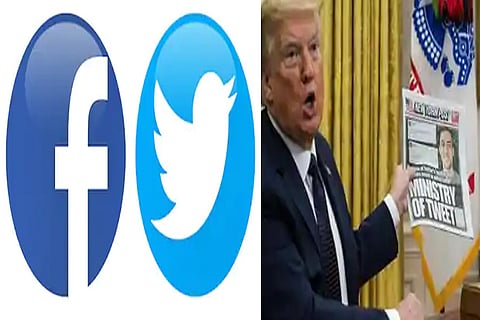

Chennai
The new legislation may revoke Section 230, a law that protects social media firms from legal liability arising from the content posted by users.
The order came about as a fallout of the microblogging site calling out the US President for a set of tweets that it termed deserved ‘fact-checking’. The tweets in question concerned the nature of mail-in ballots, which according to Trump would constitute massive fraud. Speaker Nancy Pelosi did not side with Twitter, but still went on record to criticise Trump, calling his order a distraction tactic for the mishandling of the corona crisis, adding that the order “does nothing to address big Internet companies’ complete failure to fight the spread of misinformation.” Shrugging off the criticism, Twitter continued its campaign against so-called ‘fake news’ by assigning a public interest notice against yet another tweet by the Chinese foreign ministry spokesman, who claimed that the coronavirus ‘might have been brought to Wuhan by the US Army.’
While the role of internet majors and news outlets in curbing misinformation has been the subject of ongoing debates for a while now, there seems to be a clear building up of factions on both sides of the fence. One of the biggest critics of Twitter’s move has been Facebook founder Mark Zuckerberg. He went on to say that, “Facebook shouldn’t be the arbiter of truth of everything that people say online. Private companies probably shouldn’t be, especially these platform companies, shouldn’t be in the position of doing that.”
It might be worth noting that what Twitter has set off can be seen as the consequence of several levels of scrutiny that social media giants have been subjected to in the past few years, concerning the proliferation of misinformation. Instant messaging behemoth WhatsApp had just a few months ago, limited the number of forwards to five for a single message that any individual can send, to curb the spread of fake news. It also led to the spawning of several fake news busting sites and fact-checkers, whose roles have once again started gaining prominence, especially in the backdrop of COVID-19, which has opened up a veritable Pandora’s Box of rumours and misinformation.
Irrespective of the reasons that led up to the order, this spat might bring about some much-needed relief to the bane of fake news globally. There need to be more reforms introduced to curb the spread of misinformation on social media. We also need frameworks for improving accountability among those who disseminate such news as well as the platforms that help them do so. But what needs to be done on priority is to hold back from killing the messenger.
Visit news.dtnext.in to explore our interactive epaper!
Download the DT Next app for more exciting features!
Click here for iOS
Click here for Android